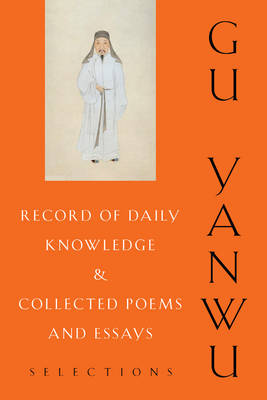
Stock image for illustration purposes only - book cover, edition or condition may vary.
Record of Daily Knowledge and Collected Poems and Essays: Selections
Yanwu Gu
€ 94.87
FREE Delivery in Ireland
Description for Record of Daily Knowledge and Collected Poems and Essays: Selections
Hardback. Translator(s): Johnston, Ian. Series: Translations from the Asian Classics. Num Pages: 352 pages. BIC Classification: DQ; HRKN1. Category: (P) Professional & Vocational. Dimension: 165 x 257 x 28. Weight in Grams: 604.
Gu Yanwu pioneered the late-Ming and early Qing-era practice of Han Learning, or Evidential Learning, favoring practical over theoretical approaches to knowledge. He strongly encouraged scholars to return to the simple, ethical precepts of early Confucianism, and in his best-known work, Rizhi lu (Record of Daily Knowledge), he applied this paradigm to literature, government, economics, history, education, and philology. This volume includes translations of selected essays from Rizhi lu and Gu Yanwu's Shiwen Ji (Collected Poems and Essays), along with an introduction explaining the personal and political dimensions of the scholar's work. Gu Yanwu wrote the essays and poems featured in this volume while traveling across China during the decades immediately after the fall of the Ming Dynasty. They merge personal observation with rich articulations of Confucian principles and are, as Gu said, not old coin but copper dug from the hills. Like many of his contemporaries, Gu Yanwu believed the Ming Dynasty had suffered from an overconcentration of power in its central government and recommended decentralizing authority while strengthening provincial self-government. In his introduction, Ian Johnston recounts Gu Yanwu's personal history and reviews his published works, along with their scholarly reception. Annotations accompany his translations, and a special essay on feudalism by Tang Dynasty poet and scholar Liu Zongyuan (773-819) provides insight into Gu Yanwu's later work on the subject.
Product Details
Publisher
Columbia University Press
Format
Hardback
Publication date
2016
Series
Translations from the Asian Classics
Condition
New
Weight
604g
Number of Pages
352
Place of Publication
New York, United States
ISBN
9780231170482
SKU
V9780231170482
Shipping Time
Usually ships in 15 to 20 working days
Ref
99-15
About Yanwu Gu
Gu Yanwu (1613-1682), born in the late years of the Ming Dynasty, had an unusual education, supervised by his grandfather and his adoptive mother, Wang. The latter, a woman of high principles, starved herself to death rather than live under the rule of the Manchus. She implored her son never to serve the dynasty in an official capacity. Complying with her deathbed wish, Gu Yanwu led an itinerant and eventful life, devoting himself to study and writing on a wide range of subjects. His overall aim, once hope of a Ming restoration had faded, was the betterment of self and society. The foundations of his thought were a deep study of the original classics and devolution in administration. After his death, his writings, when finally published, had a profound and enduring influence. Ian Johnston is an independent scholar and translator. He has published translations of early Chinese philosophical works and Chinese poetry, as well as translations of classical Greek medical texts.
Reviews for Record of Daily Knowledge and Collected Poems and Essays: Selections
Gu Yanwu is a towering figure in modern Chinese thought, and the political ideas and research methods in his Record of Daily Knowledge inspired the major intellectual movements of the Qing Dynasty. Ian Johnston makes Gu's notoriously difficult writings accessible to English-language readers for the first time. Meticulously translated, Johnston's Gu is a gift to China studies and to the comparative history of political thought.
John Delury, Yonsei University Graduate School of International Studies (Seoul) Gu Yanwu's Record of Daily Knowledge consists of more than a thousand notes and essays he wrote after the collapse of Ming China in the seventeenth-century. For those who have the impression that Confucian political philosophy is essentially applied virtue ethics, focusing on the cultivation of personal virtues of literati-officials, Gu offers a refreshing alternative vision of Confucianism as the art of statecraft, emphasizing the need for institutional reform, the balance of power, and the importance of a humane economy. Gu's hope for an ideal society, in which people are free from the domination of arbitrary political and economic power, still speaks to us today. In this sense, Ian Johnston's lucid and compelling translation is a timely gift.
Yang Xiao, Kenyon College
John Delury, Yonsei University Graduate School of International Studies (Seoul) Gu Yanwu's Record of Daily Knowledge consists of more than a thousand notes and essays he wrote after the collapse of Ming China in the seventeenth-century. For those who have the impression that Confucian political philosophy is essentially applied virtue ethics, focusing on the cultivation of personal virtues of literati-officials, Gu offers a refreshing alternative vision of Confucianism as the art of statecraft, emphasizing the need for institutional reform, the balance of power, and the importance of a humane economy. Gu's hope for an ideal society, in which people are free from the domination of arbitrary political and economic power, still speaks to us today. In this sense, Ian Johnston's lucid and compelling translation is a timely gift.
Yang Xiao, Kenyon College
